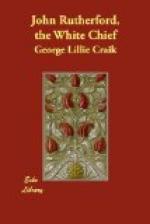A party of New Zealanders thus wandering through their country, with all the inconveniences attending the movement of large bodies of men, but without the combinations of foresight which are necessary for the safety of an army, or the management of supplies, must be occasionally exposed to great privations.
Their island, however, it would seem from Rutherford’s narrative, abundantly supplied them with provisions, and their slaves were at hand to perform the office of cooks. Their method of procuring fire for culinary purposes and warmth is curious; and we may as well mention it somewhat fully here, before we proceed to the more busy parts of Rutherford’s narrative.
When Nicholas was in New Zealand, he had an opportunity of seeing the process usually resorted to. “The place where we landed,” says he, speaking of an excursion which he made with Marsden, and some of the chiefs, to a place a short distance from the Missionary Settlement, “was a small plantation of potatoes belonging to Shungie, and here our party intended to prepare their refreshments, seating themselves, along the ground for the purpose. Fire, however, was wanting; and to procure it, Shungie took my fowling-piece, and, stopping up the touch-hole, he put a small piece of linen into the pan, and endeavoured to excite a spark. But this expedient proved unsuccessful, as the lock had got rusted and would not go off; he then got some dry grass and a piece of rotten wood, and turning a small stick rapidly between his hands, in the same manner as we mill chocolate, the friction caused the touchwood, in which the point of the stick was inserted, to take fire; while, wrapping it up in the dry grass, and shaking it backward and forward, he very soon produced a flame, which he communicated to some dry sticks, and other fuel that our party had collected.”
This was not, however, any sudden device of Shungie’s, but merely the contrivance in general use in such emergencies among his countrymen.
“We have mentioned two New Zealanders, who are at present in this country, and have recently been exhibiting the dances and other customs of their native land, in several of our provincial towns. Among other things which they show is this method of kindling fire, and we extract from the letter of a correspondent who saw them at Birmingham, the following account of this part of their performance:—’A small board of well-dried pine was laid upon the floor, and the younger New Zealander took in his hand a wedge about nine inches long, and of the same material; then rubbing with this upon the board, in a direction parallel to the grain, he made a groove, about a quarter of an inch deep and six or seven inches long. The friction, of course, produced a quantity of what, had it been produced by another means, would have been called sawdust; and this he collected at the end of the groove farthest from that part of the board on which he was kneeling. He then continued his




